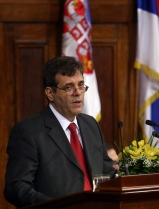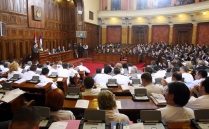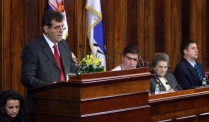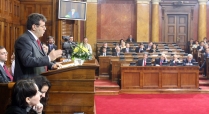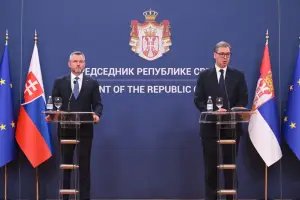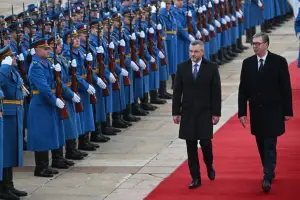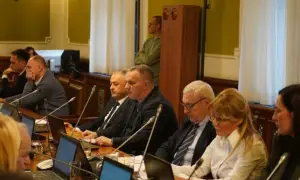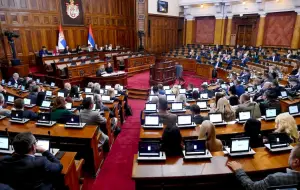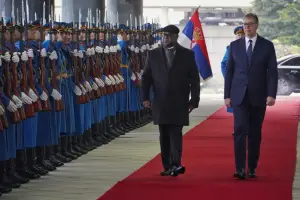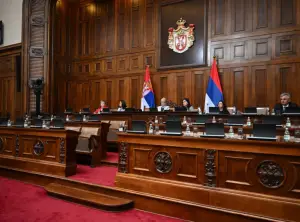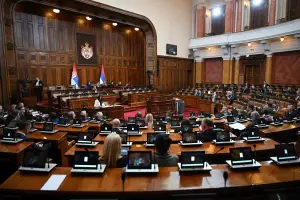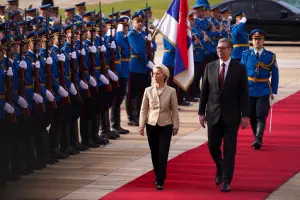Q:
A:
Parliament should reject all provisions of Ahtisaari's plan violating Serbia's sovereignty and territorial integrity
Belgrade,
14 February 2007
Serbian Prime Minister Vojislav Kostunica said today that Martti Ahtisaari's proposal on the future status of Kosovo-Metohija is an illegal and illegitimate act both in terms of its contents and form, and that Serbian parliament, peacefully and with full confidence in the principles of law and justice, should simply reject all provisions of this Proposal that violate sovereignty and territorial integrity of the Republic of Serbia.
The official website of the Serbian government brings the Prime Minister's speech in full:
Honourable parliament members,
I congratulate you on the election and constitution of the new Parliament, to which I wish with all my heart successful work to the welfare of the state and people of Serbia.
Today Serbian parliament should respond with a resolution to the proposal of Martti Ahtisaari on the future status of the Autonomous Province of Kosovo-Metohija, which he brought to Belgrade on February 2. The draft resolution, which is in front of you, was adopted by the government at yesterday's session, on the basis of a text prepared by the State negotiating team on the future status of Kosovo-Metohija, following consultations with the parties that make the composition of this parliament.
It is well known that every generation in Serbia was affected by the issue of Kosovo-Metohija. Therefore, Serbia's answer at its supreme representative body must express the will and interest of the present generation, necessarily take into account the interests of future generations, as well as what previous generations have done throughout centuries to speak up for and defend national and state interests of Serbia.
Therefore, let's start from the day when Martti Ahtisaari came to Belgrade with his proposal and the manner in which he did it. The whole world knew that parliamentary elections were held in Serbia on January 21, with the aim of choosing a new parliament and government. Exactly eleven days after the elections, when the electoral process still had not been completed, let alone state bodies constituted, without any previous consultations or agreements with Belgrade as a host, Ahtisaari himself decided to come and deliver his proposal.
Honourable parliament members,
I congratulate you on the election and constitution of the new Parliament, to which I wish with all my heart successful work to the welfare of the state and people of Serbia.
Today Serbian parliament should respond with a resolution to the proposal of Martti Ahtisaari on the future status of the Autonomous Province of Kosovo-Metohija, which he brought to Belgrade on February 2. The draft resolution, which is in front of you, was adopted by the government at yesterday's session, on the basis of a text prepared by the State negotiating team on the future status of Kosovo-Metohija, following consultations with the parties that make the composition of this parliament.
It is well known that every generation in Serbia was affected by the issue of Kosovo-Metohija. Therefore, Serbia's answer at its supreme representative body must express the will and interest of the present generation, necessarily take into account the interests of future generations, as well as what previous generations have done throughout centuries to speak up for and defend national and state interests of Serbia.
Therefore, let's start from the day when Martti Ahtisaari came to Belgrade with his proposal and the manner in which he did it. The whole world knew that parliamentary elections were held in Serbia on January 21, with the aim of choosing a new parliament and government. Exactly eleven days after the elections, when the electoral process still had not been completed, let alone state bodies constituted, without any previous consultations or agreements with Belgrade as a host, Ahtisaari himself decided to come and deliver his proposal.
The issue here is not a basic state protocol, but something much deeper and more serious. It is the intention to bring such a fateful proposal to Serbia exactly at the moment when two out of three crucial institutions of power, the parliament and government, are not constituted. That is why our obligation here in parliament is to point to the very circumstances of Ahtisaari's arrival to Belgrade.
Of course, it is much more important to examine and evaluate the proposal which Ahtisaari brought to Belgrade. To put it shortly, he delivered a proposal on Serbia's dismemberment. It is the proposal to take15% of Serbia's territory away by force. It is the proposal to change Serbia's internationally recognised borders against her will. It is the proposal to violate the UN Charter on the example of Serbia, to trample the principles of international law, disregard the will of the people of Serbia showed at the referendum and ignore the Serbian Constitution.
The content of the Proposal unambiguously shows that Ahtisaari, instead of dealing with the issue of administration of the province of Kosovo, breached his mandate and opened the question of status of the Serbian state. In fact, that is a proposal to take away part of Serbian territory and redraw its borders, in order to create another Albanian state on its territory. If such a proposal is delivered to a sovereign state, then it is clear that behind all that there can be no proper explanation or any real argument, except for the argument of force and the law of the stronger.
Honourable members of parliament, it is our duty today to call a spade a spade. By giving a clear answer, our duty is to refuse to become an accessory to law's retreat before force. It is necessary that the entire world becomes aware that this is nothing but an overt and violent attack on the integrity of a democratic, European state. The persistence to request precisely from Serbia something that no state can ever give if it does not want to lose its statehood, its identity and the place among people and nations is particularly astonishing and worrying.
Of course, it is much more important to examine and evaluate the proposal which Ahtisaari brought to Belgrade. To put it shortly, he delivered a proposal on Serbia's dismemberment. It is the proposal to take15% of Serbia's territory away by force. It is the proposal to change Serbia's internationally recognised borders against her will. It is the proposal to violate the UN Charter on the example of Serbia, to trample the principles of international law, disregard the will of the people of Serbia showed at the referendum and ignore the Serbian Constitution.
The content of the Proposal unambiguously shows that Ahtisaari, instead of dealing with the issue of administration of the province of Kosovo, breached his mandate and opened the question of status of the Serbian state. In fact, that is a proposal to take away part of Serbian territory and redraw its borders, in order to create another Albanian state on its territory. If such a proposal is delivered to a sovereign state, then it is clear that behind all that there can be no proper explanation or any real argument, except for the argument of force and the law of the stronger.
Honourable members of parliament, it is our duty today to call a spade a spade. By giving a clear answer, our duty is to refuse to become an accessory to law's retreat before force. It is necessary that the entire world becomes aware that this is nothing but an overt and violent attack on the integrity of a democratic, European state. The persistence to request precisely from Serbia something that no state can ever give if it does not want to lose its statehood, its identity and the place among people and nations is particularly astonishing and worrying.
Rejecting the argument of force and the law of the stronger, Serbia tells to the world that it respects only arguments of law and justice. In Serbian and any other language, that means that Kosovo-Metohija is an integral and inalienable part of Serbia's territory. That means that Kosovo-Metohija cannot be independent, even if taken by force and legal violence. Because what is usurped will always remain usurped, just like lawlessness cannot be turned into lawfulness. Serbia cannot and must not let something like that happen. As long as Serbia sticks to law and justice, Kosovo will be hers. As long as it sticks to those principles, Serbia will not be defeated or humiliated. We do not deny the fact that there are many who are superior in force to Serbia, but we are resolved not to give priority to anyone when it comes to law and justice.
I am strongly assured that you share the opinion that the request to seize one part of Serbia, and not just any part but Kosovo-Metohija, with Serbia’s own hands, on its behalf and at the expense of its elementary dignity, is unacceptable. As Ahtisaari’s proposal is essentially and formally an illegal and illegitimate act, Serbian parliament, relying on the principles of law and justice, should simply reject all provisions from this Proposal that violate sovereignty and territorial integrity of the Republic of Serbia.
Serbia is assured that we have the strongest possible weapon for all further talks that will take place in Vienna. That invincible weapon is law and justice. That is why all pressures are in vain and all offers senseless – everything they call “carrots” so that Serbia would give up these principles. The simple truth is: there can be no compensation for Kosovo. We will go to Vienna to explain that Serbia is ready for every sensible compromise and agreement with everyone who respects principles that international order is based on.
I am strongly assured that you share the opinion that the request to seize one part of Serbia, and not just any part but Kosovo-Metohija, with Serbia’s own hands, on its behalf and at the expense of its elementary dignity, is unacceptable. As Ahtisaari’s proposal is essentially and formally an illegal and illegitimate act, Serbian parliament, relying on the principles of law and justice, should simply reject all provisions from this Proposal that violate sovereignty and territorial integrity of the Republic of Serbia.
Serbia is assured that we have the strongest possible weapon for all further talks that will take place in Vienna. That invincible weapon is law and justice. That is why all pressures are in vain and all offers senseless – everything they call “carrots” so that Serbia would give up these principles. The simple truth is: there can be no compensation for Kosovo. We will go to Vienna to explain that Serbia is ready for every sensible compromise and agreement with everyone who respects principles that international order is based on.
It is of utmost importance, and this must be recorded and remembered, that Serbia offered the greatest possible degree of autonomy to the Albanian national minority in Kosovo-Metohija. It is utterly untrue that Serbia allegedly only said what it does not want, and what it wants. We said, we wrote down and signed that Serbia offers the largest possible degree of autonomy to the Albanian national minority. We offered a thorough and well-expounded proposal of that autonomy in the Platform of the state negotiating team as far back as on January 5, 2006 and expressed readiness for any talks on our suggestions. We recalled then, just like we recall now, that European and any other democratic standards order that national minorities should protect their rights, either individual or collective, only through different degrees of autonomy and systems of minority rights, and not through breaking the existing states.
The one who rejects all this and wants to forcefully divide Serbia must be aware of taking responsibility for the consequences of their violence. They likewise need to be aware of the fact that Kosovo is not a unique case that allows a playful approach to the principle of inviolability of borders whereby in other cases the principle would be allegedly respected. On the contrary, disrespecting this principle would be an utterly serious precedent. It is not accidentally that this issue is addressed with great responsibility and discussed in the political public of some other countries, in justified fear from old as well as new statehood pretensions of their national minorities. These are simple and indisputable truths that cannot be avoided, whatever is said or done.
And finally, things can be approached in quite a different manner. What could anyone who is remotely unbiased object to concerning our proposal for solution of the Kosovo-Metohija problem? Are we perhaps violating some European standard, or some principle of international law? Are we perhaps denying some right to the Albanian national minority? What is disputable in our effort to respect the principle of sovereignty and territorial integrity, to respect the UN Charter, to respect the principle of sovereignty and territorial integrity? Serbia has not yet heard one clear and deserving answer to these questions.
Honourable parliament members, you naturally belong to different parties and you have different opinions on many issues, even Kosovo-Metohija. In spite of all that, I invite you today, when Serbia is facing this fateful issue, to reach a consensus. Kosovo is the issue of Serbia, the Serbian people and is much older than our present beliefs. Today is an important day, a historical day. Before God and the people, we have to once again show resoluteness and the strongest will that Serbia remains what it has to be, a state in its entirety, firmly loyal to freedom, law and justice and up to its historical destiny,” said the Prime Minister.
The one who rejects all this and wants to forcefully divide Serbia must be aware of taking responsibility for the consequences of their violence. They likewise need to be aware of the fact that Kosovo is not a unique case that allows a playful approach to the principle of inviolability of borders whereby in other cases the principle would be allegedly respected. On the contrary, disrespecting this principle would be an utterly serious precedent. It is not accidentally that this issue is addressed with great responsibility and discussed in the political public of some other countries, in justified fear from old as well as new statehood pretensions of their national minorities. These are simple and indisputable truths that cannot be avoided, whatever is said or done.
And finally, things can be approached in quite a different manner. What could anyone who is remotely unbiased object to concerning our proposal for solution of the Kosovo-Metohija problem? Are we perhaps violating some European standard, or some principle of international law? Are we perhaps denying some right to the Albanian national minority? What is disputable in our effort to respect the principle of sovereignty and territorial integrity, to respect the UN Charter, to respect the principle of sovereignty and territorial integrity? Serbia has not yet heard one clear and deserving answer to these questions.
Honourable parliament members, you naturally belong to different parties and you have different opinions on many issues, even Kosovo-Metohija. In spite of all that, I invite you today, when Serbia is facing this fateful issue, to reach a consensus. Kosovo is the issue of Serbia, the Serbian people and is much older than our present beliefs. Today is an important day, a historical day. Before God and the people, we have to once again show resoluteness and the strongest will that Serbia remains what it has to be, a state in its entirety, firmly loyal to freedom, law and justice and up to its historical destiny,” said the Prime Minister.

